On a daily basis, healthcare providers deal with manual, paper-based tasks such as billing and claims management, patient onboarding, delegating medical professionals, collecting patient data, and providing prescriptions - among others.
While these tasks are tedious and time-consuming, they're absolutely critical. However, as more people seek medical attention, these manual tasks take longer to complete and become prone to error, putting the institution and patient at risk.
For our global healthcare system to cope with the rising demand for medical services, it's absolutely critical that they focus their resources on adapting processes to be more efficient and focused on patient safety.
Automation in the healthcare industry can encompass various processes such as
- Simplifying patient appointment scheduling. Healthcare institutions have to collect personal information, diagnosis, insurance details, and confirm the doctor's availability. If the right information cannot be accessed during the registration process, or if the doctor is not available, it's up to the staff to inform the patient beforehand.
- Recording of audit procedures. Collecting, verifying, and reporting are critical parts of the audit process, but each step requires the input of multiple people, leaving room for misinterpretation and error.
- Speeding up account settlements. Healthcare institutions have to monitor, calculate, and evaluate bills accumulated during the diagnosis and treatment of each patient. These records must be accurate, but since processing this data is usually done manually it's error-prone, which leaves the institution at risk of non-compliance and payment delays.

Still the big question remains on whether the healthcare industry is ready for automation? McKinsey analysts predict that as much as half of current work activities will be automated by 2055. But healthcare will be different by then - and yes, dramatically better. Diagnoses will become increasingly automated and driven by massive amounts of patient data.
By automating the productivity in the healthcare industry we will experience an advanced patient experience. By increased automation it will mean that healthcare professionals can cut a significant amount of routine tasks from their busy days and focus on their more skilled work.
Patient satisfaction comprises of a number of factors such as:
- The level of care the patient receives when visiting an organization.
- The ease and accessibility of scheduling and attending appointments.
- The total time an appointment takes, including waiting time.
Considering that 1 in 6 people will be over the age of 65 by 2050, the future dictates that these manual tasks will be at an even higher volume. Healthcare workers simply don't have the time to be filling out forms while simultaneously tending to a room filled with patients; neither will be done properly and the consequences are much too high.
Automation has enabled many industries to revolutionize the way they work and applying it to the healthcare industry can lead to the same result. Automating operational and administrative tasks can result in better patient experience, improved quality of medical service, reduced risk of non-compliance, and lowered costs.
Contact us to see how Ubunye can assist you to digitize your processes and take your patient experience to the next level.

